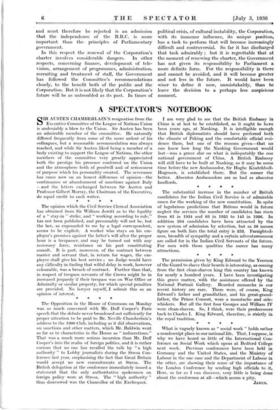A SPECTATOR'S NOTEBOOK
SIR AUSTEN CHAMBERLAIN'S resignation from the Executive Committee of the League of Nations Union is undeniably a blow to the Union. Sir Austen has been an admirable member of the committee. He naturally differed frequently from some of the more ardent of his colleagues, but a reasonable accommodation was always reached, and while Sir Austen liked being a member of a body existing to support the League of Nations, the other members of the committee very greatly appreciated both the prestige his presence conferred on the Union and the atmosphere both of goodwill and of seriousness of purpose which his personality created. The severance has come now on an honest difference of opinion—the continuance or abandonment of sanctions against Italy —and the letters exchanged between Sir Austen and Professor Gilbert Murray, the Chairman of the Executive, do equal credit to each writer.
The opinion which the Civil Service Clerical Association has obtained from Sir William Jowitt as to the legality of a " stay-in " strike, and " working according to rule," has not been published, and presumably will not be, but the law, as expounded to me by a legal correspondent, seems to be explicit. A worker who stays on his em- ployer's premises against the latter's will after the proper hour is a trespasser, and may be turned out with any necessary force, resistance on his part constituting assault. It is part, moreover, of the contract between ' master and servant that, in return for wages, the em- ployee shall give his best service ; no Judge would have any difficulty in finding that wilful delay in work, however colourable, was a breach of contract. Further than that, in respect of trespass servants of the Crown might be in increased jeopardy if their trespass was on War Office or Admiralty or similar property, for which special penalties are provided. No lawyer myself, I submit this as an opinion of interest. * * * * The Opposition in the House of Commons on Monday was so much concerned with Mr. Duff Cooper's Paris speech that the debate never broadened out sufficiently for proper attention to be paid to Mr. Neville Chamberlain's address to the 1900 Club, including as it did observations, on sanctions and other matters, which Mr. Baldwin went so far as to characterise in the House as " indiscretions." That was a much more serious incursion than Mr. Duff Cooper's into the realm of foreign politics, and it is rather curious that no one has recalled the talk by " a high authority " to Lobby journalists during the Stresa Con- ference last year, emphasising the fact that Great Britain would accept no new commitments at Stresa. The British delegation at the conference immediately issued a statement that the only authoritative spokesmen on foreign policy were at Stresa. The " high authority " thus disavowed was the Chancellor of the Exchequer. I am very glad to see that the British Embassy in China is at last to be established, as 'it ought to have been years ago, at Nanking. It is intelligible enough that British diplomatists should have preferred both the climate of Peking and the comfortable official resi- dence there, but one of the reasons given—that no one knew how long the Nanking Government would last—was a grave slur on what is indisputably the one national government of China. A British Embassy will still have to be built at Nanking, so it may be some time before the new Ambassador, Sir Hughe Knatchbull- Hugessen, is established there. But the sooner the better. Absentee Ambassadors are as bad as absentee landlords.
* * The substantial increase in the number of British candidates for the Indian Civil Service is of admirable omen for the working of the new constitution. In spite of lugubrious predictions that Britons would in future neglect the services the number of candidates has risen from 85 in 1934 and 83 in 1935 to 145 in 1986. In addition 264 candidates have been attracted by the new system of admission by selection, but as 56 names figure on both lists the total entry is 858. Farsighted- ness, breadth of sympathy and a certain adventurousness are called for in the Indian Civil Servants of the future. .For men with those qualities the career has many attractions.
The permission given by King Edward to the Yeomen of the Guard to shave their beards is interesting, as coming from the first clean-shaven king this country has known for nearly a hundred years. I have been investigating this grave matter, with the assistance offered by the National Portrait Gallery. Bearded monarchs in our recent history are rare. There were, of course, King Edward's father and grandfather, and his great-grand- father, the Prince Consort, wore a moustache and side- whiskers. But all the first four Georges and William IV were clean-shaven. So, I think, were their predecessors back to Charles I. King Edward, therefore, is strictly in the royal tradition. * * What is vaguely known as " social work " holds rather a nondescript place in our national life. That, I suppose, is why we have heard so little of the International Con- ference on Social Work which opens at Bedford College next week. Previous conferences have been held in Germany and the United States, and the Ministry of Labour in the one case and the Department of Labour in the other, are showing their sense of the importance of the London Conference by sending high officials to it, Here, so far as I can discover, very little is being done about the conference at all—which seems a pity.
JANUS:














































 Previous page
Previous page